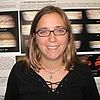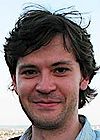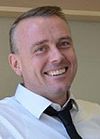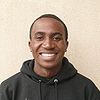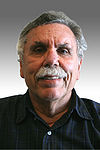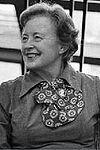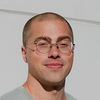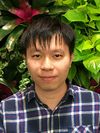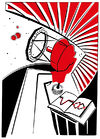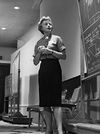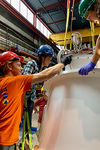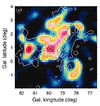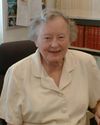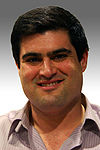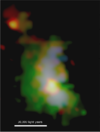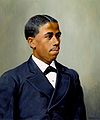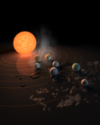From CASS
IMPORTANT NOTE
The Center for Astrophysics & Space Sciences (CASS) has transitioned to the new Department of Astronomy & Astrophysics at https://astro.ucsd.edu. This website will not be maintained after 1 July 2023.
Welcome
The Center for Astrophysics & Space Sciences (CASS) is an interdisciplinary research unit for research and graduate study in astronomy, astrophysics, and space sciences. Areas of specialization include high-energy astrophysics, optical and ultraviolet astronomy, infrared astronomy, radio astronomy, theoretical astrophysics, cosmology, solar physics, space plasma physics, interferometry, and astronomical instrumentation. CASS includes faculty, research staff and students affiliated with UCSD's departments of Physics, Chemistry and Biochemistry, and Electrical and Computer Engineering (ECE), and others.
CASS News
2022
| 29 March 2022 : Professor Shelley Wright to receive SETI Institute’s 2022 Drake Award
Wright has been a pioneer optical and near-infrared SETI instrument development and research throughout her career. Some of Wright's contributions include leading and collaborating on the design, construction, and implementation of pulsed laser SETI instruments. Wright was a critical team member that developed one of the most advanced optical SETI experiments and was the Principal Investigator of the first near-infrared SETI instrument (NIROSETI) and survey. Wright is currently the Principal Investigator of an all-sky, all-the-time panoramic SETI observatory called ‘PANOSETI.’ Congratulations Shelley! Read More |
2021
| 18 November 2021 : Professor Dusan Keres among the world’s most influential researchers
Professor Keres is among the world’s most influential researchers in their fields according to the 2021 Clarivate listing of Most Highly Cited Researchers in the World. Clarivate’s 2021 list identifies some 6,600 researchers from across the globe who demonstrated significant influence in their chosen field or fields through the publication of multiple highly cited papers during the last decade. Read More |
 | 10 November 2021 : Megan Grace Li 2021 Universities Space Research Association Distinguished Undergraduate Megan Grace Li is a 2021 Universities Space Research Association Distinguished Undergraduate. She will graduate UCSD this Winter with a B.S. in Physics with a Specialization in Astrophysics. At UCSD, she researches the morphology of nearby galaxies under Dr. Karin Sandstrom. |
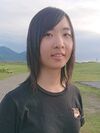 | 5 November 2021 : Yu-Hsuan “Eltha” Teng awarded prestigious GSSA scholarship Graduate student Yu-Hsuan “Eltha” Teng was awarded a prestigious scholarship from the government of Taiwan. It is called the "Government Scholarship to Study Abroad" (GSSA) and is an honor given to a small number of Taiwanese students pursuing a PhD degree outside of Taiwan. The scholarship comes from the Ministry of Education of Taiwan. |
| 18 October 2021 : Professor and Dean of Physical Sciences Steven Boggs is Deputy PI on a NASA gamma-ray telescope, COSI, selected for funding
This instrument will observe gammas from electromagnetic decays of (relatively!) fresh nucleosynthesis products from explosive astrophysical environments as well as gammas from positron annihilation and other sources. As such it will be in a position to constrain ideas on the synthesis of the elements and chemical and Galactic evolution. The instrument can also give a handle on the production of positrons in the Galaxy. These capabilities put COSI at the heart of the multi-messenger astrophysics enterprise. Its observations may provide insight into the origin of the r-process in compact object-based sources, the nature of dark matter, primordial black holes, and the possible effects of these if captured by neutron stars. See the NASA website announcement - Read More |
| | 16 July 2021 : Dr. Sean Casey appointed SA General Project Manager
Dr Sean Casey has been appointed as the General Project Manager of the Simons Array working with Professors Brian Keating and Kam Arnold in CASS effective July 16th. Dr. Casey’s activities include the deployment, optimization, operations, data processing, and infrastructure at the 5200 meter elevation Simons Array site in the Atacama Desert of Northern Chile. Welcome aboard, Dr Casey! |
| 17 June 2021 : Quinn Konopacky recipient of NSF Career Award
We congratulate Professor Quinn Konopacky on receiving a prestigious National Science Foundation Career Award! The following link gives a write-up on this award and on the other UCSD Physical Sciences faculty NSF Career Award recipients. Read More |
| 25 March 2021 : Christian Aganze earns Beth Brown Memorial Award
Graduate student Christian Aganze has been awarded the Beth Brown Memorial Award, recognizing his contribution to the 2020 National Society of Black Physicists (NSBP) conference, “Searching for Distant Ultracool Dwarfs in Deep HST/WFC3 Surveys”, as the Best Graduate Student Poster Presentation. Read More |
| 8 February 2021 : Adam Burgasser elected to be AAS Vice President
Prof. Adam Burgasser was elected to be the next Vice-President of the American Astronomical Society. As one of three VPs elected on overlapping 3-year terms, Burgasser will be responsible for organizing AAS national conferences and serves on the AAS Board of Trustees. Read More |
2020
| 12 October 2020 : N3AS now a full NSF Physics Frontier Center (PFC)
The Network for Neutrinos, Nuclear Astrophysics, and Symmetries (N3AS), established in 2016 as the first NSF “Hub”, has now become a full NSF Physics Frontier Center (PFC). The NSF PFC award was made effective September 1, 2020. Headquartered at UC Berkeley, with Wick Haxton as the the overall PI, the new PFC has co-Investigators from several other institutions including: Andre DeGouvea, Northwestern University; Sanjay Reddy, University of Washington; Gail McLaughlin, North Carolina State University; Baha Balantekin, University of Wisconsin Madison; and George Fuller and Tongyan Lin from UC San Diego. The primary research foci of the N3AS will be on neutrino physics and astrophysics, the origin of the elements, the physics of dense and ultra-dense matter, compact object and early universe physics, gravitational wave and multi-messenger astrophysics, astrophysical simulation and high performance computing, and the nature of dark matter. The original N3AS Hub had contributions over three years of $2.4M from NSF and $575,000 from the Heising-Simons Foundation. The commitment from NSF for the new PFC will be $10.9M over five years. The N3AS, currently with 8 postdoctoral fellows, will seek to hire 4 fellows per year to conduct research for 3 years. Fellows will spend the first two years at any of the N3AS institutions of their choosing. They will move to a different N3AS institution for year 3. In practice, the fellows collaborate across these institutions, with adequate funding for (in better times) travel. The N3AS website: Read More |
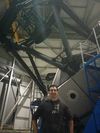 | 25 September 2020 : Chris Theissen receives Chancellor's Outstanding Postdoctoral Scholar Award
Chris Theissen is among five recipients of the 2020-21 Chancellor's Award for Outstanding Postdoctoral Scholar. This award recognizes the well-rounded postdoctoral scholar who not only excels in research and advances the frontiers of science, but also provides leadership, mentorship, and service. Congratulations Chris! |
| 12 July 2020 : Astronomers Discover Ancient Metal-Starved Brown Dwarfs
Prof. Adam Burgasser and graduate student Roman Gerasimov have contributed to the discovery and analysis of two ancient brown dwarfs that have heavy element abundances 10-100 times less than the Sun, first identified by a team of citizen scientists. Read More |
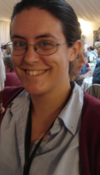 | 28 May 2020 : Sandstrom receives Outstanding Mentor Award
Prof. Karin Sandstrom has been selected to receive an Outstanding Mentor Award Karin was nominated by students and selected from a competitive group of faculty from the entire campus. Congratulations Karin! |
| 23 May 2020 : New massive disk galaxy named after Arthur M. Wolfe
Astronomers have spotted a massive disk galaxy, not unlike our own, that formed 12.5 billion years ago when our 13.8 billion-year-old universe was only a tenth of its current age. But according to what scientists know about galaxy formation, this one has no business being in the distant universe. This discovery is challenging how astronomers think about galaxy formation in the early universe. It's known as Galaxy DLA0817g, but astronomers nicknamed it the Wolfe Disk after late astronomer Arthur M. Wolfe. Read More |
| 5 April 2020 : Professor Emeritus of Physics E. Margaret Burbidge passes away at age 100
Sad news. Margaret Burbidge has passed away. She was 100 years old. A towering figure in the development of modern physics and astronomy, she was also instrumental in founding and guiding UCSD’s efforts in those fields. Margaret and her late husband Geoffrey Burbidge were founding faculty of the UCSD Physics Department. Here is the UCSD News article. For the New York Times article: Read More |
| 25 March 2020 : Luke Johns named Einstein Fellow at UCB
Luke Johns is among the NASA Hubble Fellowship Program 2020 Fellows. He has been named an Einstein Fellow at the University of California, Berkeley. His proposal title was Oscillating Neutrinos in Core-collapse Supernovae. As an Einstein Fellow, Luke will seek to understand how neutrino flavor evolves in core-collapse supernovae and neutron-star mergers. Congratulations, Luke! Read More |
| 18 March 2020 : Dino Hsu earns International Center Fellowship
Graduate student Chih-chun "Dino" Hsu has been awarded a Friends of the International Center Fellowship. This fellowship is awarded to graduate students and medical students that “in some way promote international friendship, understanding, and cooperation in a meaningful way.” Both international scholars and scholars conducting international research with international ties are eligible to apply. Dino was one of 30 applicants selected for this award across UCSD campus. Read More |
| 9 March 2020 : Astronomers Catch Rare Eclipse of a Double Brown Dwarf System
Astronomers working on “first light” data from a newly commissioned telescope in Chile made a chance discovery that led to the identification of a rare eclipse of two brown dwarfs. The result published today in the journal Nature Astronomy. Professor Adam Burgasser is co-author on the paper. Read More |
| 5 March 2020 : New Telescopes Aim to Detect Extraterrestrial Intelligence
A team of astronomers led by UC San Diego physicist Shelley Wright is deploying a pair of telescopes that will constantly search the nighttime sky for signals from intelligent life in our galaxy. Read More |
| 25 February 2020 : E. Margaret Burbidge named Inaugural Fellow of AAS
CASS' very own E. Margaret Burbidge has been named the Inaugural Fellow of the American Astronomical Society (AAS). Please see the link below. Professor Burbidge is a towering figure in the development of modern astronomy and astrophysics. Her pioneering research in nucleosynthesis, relativistic astrophysics and QSOs/AGN, and novel use of instrumentation has been highly influential. "I know that in many ways her early work brought about the current synergistic relationship between observational astronomy and frontline nuclear and particle physics. Margaret’s scientific accomplishments have served as an inspiration to generations of young astronomers and physicists. As the AAS write-up explains, Margaret also 'broke the observatory gender boundary in the mid-20th century', and this has had very significant positive impact for women in astronomy and physics. We are very fortunate to have her and her legacy in CASS/UCSD," said Prof. George Fuller, CASS Director. Read More |
| 2 February 2020 : UC San Diego Astronomers to See More Stars with “2020 Vision”
With nearly $1 million in new funding from the foundation, Professor Quinn Konopacky is leading an effort to upgrade the Gemini Planet Imager (GPI), a high-contrast imaging system for directly detecting and studying Jupiter-like planets. The upgrades will transform GPI into an enhanced imaging system for the new decade. Read More |
| 23 January 2020 : UC San Diego Cosmologists Ramp-Up Exploration of the Universe’s Origin, Evolution
Ax Center for Experimental Cosmology (ACEC) opened a new lab space called the High Bay Physics Laboratory to integrate and test cryogenic receivers for the Simons Observatory’s small aperture telescopes, known as SATs. Read More |
2019
| 9 December 2019 : The Origin of Cosmic Rays & the Power of Multi-Messenger Investigations
In a paper on “The Origin of Cosmic Rays” just published in the Astrophysical Journal Supplement, Richard Lingenfelter shows how the elemental composition of these relativistic nuclei solves the century old puzzle of the sources and processes of their generation. Studies of their plasma properties have long shown that supernova shocks were their most likely sources, but not what produced their unique mix, nor how their ions are injected into these accelerating shocks. Recent combined abundance measurements and calculations now probe their nuclear, atomic and even solid state processes that answer those questions. They reveal that the cosmic ray mass mixing ratio of supernova ejecta and interstellar medium swept up by these shocks directly define the peak acceleration time. Moreover, in that mix fast grain sputtering injection of suprathermal ions preferentially into those accelerating shocks greatly enriches their composition in heavier elements. This at last matches their unique abundance and reveals even more. Read More |
| 28 November 2019 : Dino Hsu awarded Lattimer Award
Graduate student Chihchun "Dino" Hsu has been the 2019-2020 Carol and George Lattimer Award for Graduate Excellence. The Lattimer Award honors outstanding graduate students in UCSD’s Division of Physical Sciences who seek interdisciplinary approaches to problem solving and have a strong commitment to education, mentorship, and service. Read More |
| 25 November 2019 : Professor Dusan Keres among the world’s most influential researchers
Professor Keres is among the world’s most influential researchers in their fields. The Web of Science Group (Clarivate Analytics), which provides insights and analytics on research trends, compiled its 2019 Highly Cited Researchers list of more than 6,000 scientists from around the world whose studies were among the top one percent of most-cited publications in their field over the past 11 years. Read More |
| 31 October 2019 : The National Science Foundation’s N3AS “Hub" in the News
Despite their feeble interactions, neutrinos finally go big league and get recognized by UCSD news! |
| 30 October 2019 : Prof. Alison Coil and other researchers observe huge outflow of gas extending far beyond a galaxy for the first time
Prof. Coil and collaborators explore the influence of galactic winds from a distant galaxy called Makani. Here is the Nature article. For the UCSD News article: Read More |
| 17 October 2019 : Nick Galitzki's notable outreach efforts
Galitzki, a CASS postdoctoral scholar, volunteers for the Fleet Science Center’s popular “Two Scientists Walk into a Bar” events, answering people’s questions about space as best he can. He also helps organize “Astronomy on Tap San Diego,” where researchers give talks and engage with the public at a local brewery. Additionally, he often sets up his own personal telescope at these events and a line instantly forms. He is also a member of the League of Extraordinary Scientists and Engineers, which brings science experiments to local schools. Read More |
| 11 October 2019 : Professor Emeritus Margaret Burbidge turns 100
The first director of CASS, Professor Emeritus Margaret Burbidge turns 100 years old. Check out this video. Read More |
| 9 July 2019 : UCSD gets $20M gift to operate Simons Observatory in Chile to explore early universe
The Simons Foundation of New York is giving UC San Diego $20 million to operate the Simons Observatory, a collection of four telescopes that will be placed in Chile’s Atamaca Desert to explore what the universe was like shortly after the Big Bang. The gift increases the foundation’s total support for the observatory project to $80 million, making it among the larger philanthropic gifts of its kind. Read More |
| 22 May 2019 : Keating recipient of Excellence in Stewardship award
Prof. Brian Keating is one of three recipients of the Seventh Annual Excellence in Stewardship award. Prof. Keating demonstrates excellence in stewardship when engaging with our community of supporters. Exemplary stewardship ensures that our supporters -- donors, volunteers, and corporate and foundation partners -- understand the significance of their involvement with UC San Diego. In addition to expressing gratitude, excellent stewardship cultivates meaningful relationships to advance the university's intellectual, physical, and cultural growth. The Excellence in Stewardship awards are presented by the Trustees of the UC San Diego Foundation. The honorees will be recognized on June 6th at the annual UC San Diego Foundation Dinner. Congratulations, Prof. Keating! Read More |
| 3 May 2019 : UC San Diego Announces Margaret Burbidge Visiting Professorship Heising-Simons Foundation helps boost participation of women scientists as part of new initiative in the Division of Physical Sciences. Read More |
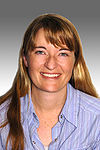 | 19 April 2019 : Coil recipient of the 2018/19 Distinguished Teaching Award
Prof. Alison Coil has been selected as a recipient of the 2018/19 Distinguished Teaching Award for Academic Senate Members.
|
| 11 April 2019 : Scientists on Wednesday revealed the first image ever made of a black hole, depicting its hot, shadowy edges where light bends around itself in a cosmic funhouse effect
Alison Coil discusses this first image of a black hole with KUSI-TV. Read More |
| 20 March 2019 : Prof. Alison Coil comments on diversity of SpaceX and whether we should colonize Mars
A new CNBC video on SpaceX and Elon Musk examines the company and space travel, and asks questions about the diversity of the SpaceX workforce and whether solving climate change on Earth should be a higher priority than colonizing Mars. Read More |
| 4 March 2019 : Einstein's Quantum Riddle: Special PBS NOVA Screening and Panel Discussion
Einstein called it "spooky action at a distance," but today quantum entanglement is poised to revolutionize technology from computers to cryptography. NOVA follows a unique experiment in the Canary Islands to use quasars at opposite ends of the universe to push back alternative explanations for entanglement to the beginning of time. Join us for a screening of the PBS NOVA documentary "Einstein's Quantum Riddle," hosted by UC San Diego's Andrew Friedman, one of the collaborators on the project, followed by a panel discussion. Moderated by UCSD CASS Prof. Brian Keating, associate director of the Arthur C. Clarke Center for Human Imagination, Friedman will be joined by Jason Gallicchio (Professor of Physics, Harvey Mudd College) and David Brin (physicist and Hugo & Nebula-winning author). Monday, March 4 2019, 6-8p, Atkinson Auditorium, UC San Diego. Free and open to the public. Please RSVP here. Read More |
| 19 February 2019 : UCSD Astronomers Contribute to Disk Discovery
Adam Burgasser and Jon Rees contributed to the discovery of a white dwarf with an unusual debris disk orbiting it. The system, LSPM J0207+3331, was originally identified by citizen scientist Melina Thévenot of Germany working through the Backyward Worlds/Planet 9 Project. The discovery was reported in Astrophysical Journal Letters today. Read More |
 | 15 February 2019 : Chris Theissen awarded NASA Sagan & NSF Postdoctoral Fellowships
Chris Theissen, a postdoctoral scholar at UCSD, has been awarded both NASA Sagan and NSF Postdoctoral Fellowships for 2019. The Sagan is one of the most prestigious postdoctoral awards in Astronomy, with an oversubscription rate of 16:1. Chris will be conducting his fellowship work with Prof. Quinn Konopacky. |
| | 4 February 2019 : Angela Berti named 2019 Bouchet Scholar
Angela Berti, CASS/Physics Graduate Student, has been selected as a 2019 Bouchet Scholar. Named for the first African American doctoral recipient in the United States (in Physics from Yale University in 1876), the Edward Alexander Bouchet Graduate Honor Society recognizes outstanding scholarly achievement and promotes diversity and excellence in doctoral education and the professoriate. Five UC San Diego Bouchet Scholars were selected from among an outstanding group of nominees — Angela was the only one from Physics — , all of whom demonstrated a commitment to the tenets of the society. The Bouchet Scholars will be invited to attend the annual Yale Bouchet Conference on Diversity in Graduate Education April 5-6, 2019 where they will be inducted into the society. Congratulations, Angela! |
| 3 January 2019 : PBS NOVA airing documentary, "Einstein's Quantum Riddle"
PBS NOVA is airing a documentary, "Einstein's Quantum Riddle" about the cosmic Bell experiment where CASS Assistant Research Scientist Andrew Friedman and collaborators tested fundamental questions about quantum entanglement with astronomical observations in the Canary Islands (S46 E2). It premiers Wed Jan 9 at 9pm on local PBS stations. Here is a teaser trailer. It is currently streaming for free on the PBS NOVA Website, and for $3 on Amazon Prime. The DVD can also be purchased from Amazon or NOVA. Read More |
2018
| 29 November 2018 : Professor Alison Coil among the world’s most influential researchers
Professor Coil is among the world’s most influential researchers in their fields. Clarivate Analytics, which provides insights and analytics on research trends, compiled its 2018 Highly Cited Researchers list of more than 6,000 scientists from around the world whose studies were among the top one percent of most-cited publications in their field over the past 10 years. Read More |
| 20 November 2018 : Cosmologist Andrew Friedman's cosmic Bell test research recently spotlighted in two science magazines
The cosmic Bell test experiment which used astronomical observations of quasars to help test quantum entanglement was recently featured in an article for Symmetry Magazine and as the cover story for this week's issue of New Scientist Magazine. Read More |
| 18 November 2018 : CASS physics Faculty Wright and Keating featured in San Diego UT piece
Awash in money, UC San Diego enjoys a golden age in research. Read More |
| 16 November 2018 : Keating's book selected as one of Amazon's 20 Best Science Books of 2018
Professor Brian Keating’s book, Losing the Nobel Prize, has been selected as one of Amazon’s 20 Best Science Books of 2018. Read More |
| 1 November 2018 : Astrophysicist Shelley Wright enlightens campus, community with portable planetarium
As a scientist who observes distant galaxies and black holes both far and near, Shelley Wright noticed an important gap in space—right on the grounds of the University of California San Diego. A proponent of teaching and training students through the observation of the night sky, Wright realized that it was time the university featured its own portable planetarium. Read More |
| 1 November 2018 : Hawaiian court clears the way for construction of one of the world’s most massive telescopes
The Hawaiian Supreme Court ruled Oct. 30 to support the construction permit of the Thirty Meter Telescope (TMT) atop Mauna Kea. According to the Honolulu Star-Advertiser, the telescope would be the biggest and most expensive in the Northern Hemisphere. It would also be one of three huge prospective telescopes that could transform astronomy in the 21st century. UC San Diego astrophysicist Shelley Wright is the Project Scientist for TMT’s first light instrument, IRIS. Read More |
| 20 August 2018 : Andrew Friedman and colleagues' "Cosmic Bell" experiment in the news: testing quantum entanglement with quasars
CASS Assistant Research Scientist Andrew Friedman's work testing quantum theory using light from distant quasars to choose measurement settings in an entanglement test has been featured as an Editors Suggestion in Physical Review Letters. See press releases from UCSD, MIT, Vienna IQOQI, and Harvey Mudd College. Also see other news coverage from Space.com, Motherboard (Vice), Gizmodo, and Physics World. Read More |
| | 30 January 2018 : Alison Coil and Karin Sandstrom receive 2017 UC San Diego Diversity Awards
Professors Alison Coil and Karin Sandstrom are each a recipient of the 2017 UC San Diego Equal Opportunity/Affirmative Action and Diversity Award. The awards ceremony will be held on Thursday, March 1, 2018 from 1:30-3:00 pm, in the Price Center West Ballroom. All are welcome to attend. |
 | 12 January 2018 : Alison Coil appointed Associate Dean for Equity, Diversity, and Inclusion in the Division of Physical Sciences
Alison Coil has been appointed to the newly created position of Associate Dean for Equity, Diversity, and Inclusion in the Division of Physical Sciences. |
2017
| 21 December 2017 : New Study Finds 'Winking' Star May Be Devouring Wrecked Planets
Carl Melis, CASS Associate Research Scientist and co-author of the paper says, "the result concerns a nearby, dusty star that has been considered as both being young with possible terrestrial-like planet building ongoing and as old with possible companion disruption. Our work demonstrates the youth of this source through X-ray and optical observations and also the existence of significant quantities of gas orbiting with the dust. We conclude that this young star is likely in the process of consuming a close-orbiting gas-giant planet." Read More |
| 21 December 2017 : 'The Martian' author Andy Weir speaks at UCSD
Andy Weir, author of 'The Martian', as part of the Arthur C. Clarke Center for Human Imagination with Prof. Brian Keating and CASS Scientist Andy Freidman. Read More |
| 20 December 2017 : UC San Diego Researchers Shed Light on Formation of Black Holes and Galaxies
Latest findings increase understanding of how powerful winds generated by super- massive black holes impact growth of a galaxy. Read More |
| 18 December 2017 : UC San Diego to design telescope to search for "ancient light" from the universe
UC San Diego has begun designing a powerful telescope that will be placed in Chile’s Atacama Desert to search for “ancient light” that could help explain how the universe arose from the Big Bang 13.8 billion years ago. |
| 13 December 2017 : UC San Diego signs on to study cosmos with massive new telescope in South America
On behalf of collaborators at institutions worldwide, the University of California San Diego recently signed a contract for the design and construction of a state-of-the-art millimeter wave telescope for the Simons Observatory. The telescope is the first of several which will be located in the high Atacama Desert of Northern Chile in 2020. Read More |
| 26 October 2017 : Quinn Konopacky named 2017-18 Hellman Faculty Fellow
Assistant Professor of Physics Quinn Konopacky has been named a UCSD Hellman Faculty Fellow for 2017-18. The Hellman Fellows Program annually awards funding to recognize faculty who show capacity for great distinction in their research and academic work, and is intended to support activities that will enhance their progress towards tenure. Congratulations, Professor Konopacky! Read More |
| | 16 October 2017 : Jérémy Chastenet joins CASS
Jérémy Chastenet has been appointed as a Postdoctoral Scholar in CASS effective October 16th. Dr. Chastenet is under the supervision of Prof. Karin Sandstrom. His research activities include studying the properties of dust in nearby galaxies using observations from the Herschel Space Observatory and the WISE All-Sky survey. Welcome aboard, Dr. Chastenet! |
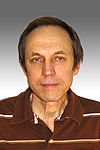 | 12 October 2017 : Malkov elected a 2017 Fellow of the APS
Mikhail Malkov has been elected a 2017 Fellow of the American Physical Society (APS) by the APS Council of Representatives upon the recommendation of the Division of Plasma Physics (DPP). The number of APS Fellows elected each year is limited to no more than one half of one percent of the membership. It is a prestigious recognition by their peers of their outstanding contributions to physics. Dr. Malkov is being recognized for his ground-breaking contributions to the theory of charged particle acceleration by collisionless shocks, the theory of nonlinear shock acceleration and injection, and the propagation of accelerated particles; for key contributions to modeling the LH transition. Congratulations Mischa! |
| | 5 October 2017 : UCSD professor and CASS engineers pioneered significant development of electron sensors for the advancement of electron microscopy
The Nobel prize in chemistry was awarded for the development of cryo-electron microscopy. The latest technical developments that made the recent breakthrough possible was the introduction of new electron detectors in electron microscopy. Early reports on the use of these sensors for the detection of electrons were presented around the mid-2000s, but these sensors had already been used as a tool in studies of charged particles in other research areas, such as astronomy. This sensor work was pioneered by Dr. Xuong of the UCSD Physics department with the support of CASS engineers Fred Dutweiler and Philippe LeBlanc. |
| | 18 September 2017 : Alex Lowell joins CASS
Alexander Lowell has been appointed as a Postdoctoral Scholar in CASS effective November 8th. Dr. Lowell is under the supervision of Prof. Steven Boggs and his research activities will involve Compton Spectrometer and Imager gamma rays. Welcome aboard, Dr. Lowell! |
| 21 August 2017 : CASS Astronomers Take Flight for Rare Solar Eclipse
Several CASS astronomers traveled far and wide to view today's special eclipse, which was the first coast-to-coast total solar eclipse in the United States in 99 years. Read More |
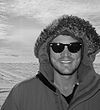 | 14 August 2017 : Jarred Roberts joins CASS
Jarred Roberts has been appointed as a Postdoctoral Scholar in CASS effective August 14th. Dr. Roberts is under the supervision of Prof. Steven Boggs and his research activities will involve high-energy physics instrumentation development for experiments like the Compton Spectrometer and Imager Explorer (COSI-X) and the General Antiparticle Spectrometer (GAPS). Welcome aboard, Dr. Roberts! |
| 11 August 2017 : TRAPPIST-1 is Older Than Our Solar System
Adam Burgasser -- first author on paper outlining a new study that the TRAPPIST-1 star is quite old: between 5.4 and 9.8 billion years. This is up to twice as old as our own solar system, which formed some 4.5 billion years ago. Read More |
| 4 August 2017 : Primordial Black Holes May Have Helped to Forge Heavy Elements Astronomers like to say we are the byproducts of stars, stellar furnaces that long ago fused hydrogen and helium into the elements needed for life through the process of stellar nucleosynthesis. As the late Carl Sagan once put it: “The nitrogen in our DNA, the calcium in our teeth, the iron in our blood, the carbon in our apple pies were made in the interiors of collapsing stars. We are made of star stuff.” But what about the heavier elements in the periodic chart, elements such as gold, platinum and uranium? Astronomers believe most of these “r-process elements”—elements much heavier than iron—were created, either in the aftermath of the collapse of massive stars and the associated supernova explosions, or in the merging of binary neutron star systems. “A different kind of furnace was needed to forge gold, platinum, uranium and most other elements heavier than iron,” explained George Fuller, a theoretical astrophysicist and professor of physics who directs UC San Diego’s Center for Astrophysics and Space Sciences. “These elements most likely formed in an environment rich with neutrons.” Read More |
| 26 July 2017 : Milky Way’s origins are not what they seem
Prof. Keres and the FIRE team found that a large fraction of matter in the Milky Way comes from far-flung galaxies. Read More |
| | 1 June 2017 : Sibasish Laha joins CASS
Sibasish Laha has been appointed as a Postdoctoral Scholar in CASS effective June 1st. Dr. Laha is under the supervision of Dr. Alex Markowitz and his research activities will involve studying how supermassive black holes residing in other galaxies are fueled. He will use observational X-ray data on dozens of gas-accreting black holes to study how matter is transported from the host galaxies. Welcome aboard! |
| 9 May 2017 : Nearby Brown Dwarf Appears to be a Free-Floating ‘Planet’
Adam Burgasser was part of an international team which has discovered that one of the closest brown dwarfs to our Sun has the same mass as a giant planet. It's called SIMP J013656.5+093347, or SIMP0136 for short, and is a well-studied brown dwarf only 21 light-years from the Sun in the constellation Pisces. Read More |
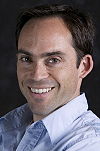 | 9 March 2017 : Adam Burgasser awarded a 2017-2018 Fulbright Scholarship
Adam Burgasser has been awarded a 2017-2018 Fulbright Scholarship to conduct astrophysical research in the United Kingdom. The Fulbright Program, initiated by Senator J. William Fulbright in 1946 and managed by the US Department of State, aims to increase mutual understanding and support of friendly and peaceful relations between people of the US and the people of other countries by awarding exchange grants to US and foreign researchers in over 155 countries. Over 370,000 Fulbright Awards have been awarded since the programs inception, and many have gone on to win Nobel Prizes and become leaders and innovators in scientific research. Adam will be in residence at the University of Exeter investigating cloud formation in the atmospheres of the coolest stars, brown dwarfs and extrasolar planets. |
| 23 February 2017 : Andrew Friedman's work on cosmic tests of fundamental quantum mechanics spotlighted
New CASS Assistant Research Scientist Andrew Friedman's work on cosmic tests of fundamental quantum mechanics has been featured as an Editors Suggestion in PRL, and is written up in Forbes, New Scientist, Quanta, and The Atlantic magazines. Here are the articles in Forbes, Quanta, and The Atlantic. For the PRL release: Read More |
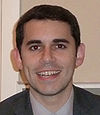 | 23 February 2017 : Andrew Friedman newly appointed in CASS
Andrew Friedman has been appointed as an Assistant Research Scientist in CASS, effective March 1st. Welcome aboard! |
| 23 February 2017 : Two graduate students selected as members of the Bouchet Graduate Honor Society
Mojegan Azadi and Daniella Bardalez Gagliuffi have been selected to be members of the UC San Diego Chapter of the Bouchet Graduate Honor Society for 2017. Their nominations demonstrate their exemplification of the characteristics of Edward A. Bouchet: Character, Leadership, Advocacy, Service, and Scholarly Achievement. Congratulations! Read More |
| 22 February 2017 : Adam Burgasser contributes to discovery of potentially habitable planetary system
Adam Burgasser is part of an international team that discovered a record-setting seven-planet system around a very low-mass, low-temperature star called TRAPPIST-1. All seven planets are roughly Earth-sized, and three reside in the star's habitable zone. Read More |
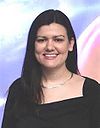 | 30 January 2017 : Quinn Konopacky receives 2016 UCSD Diversity Award
Congratulations to Quinn Konopacky, Assistant Professor of Physics, for being nominated to receive a 2016 UCSD Diversity Award! The annual Equal Opportunity/Affirmative Action and Diversity Awards Program honors staff, faculty, students, departments, and organizational units or groups that make outstanding contributions in the areas of equal opportunity, affirmative action, diversity, and the UCSD Principles of Community during the year. |
Please contact CASS website content manager Sandy Rosas
sprosas@ucsd.edu for update
requests.
